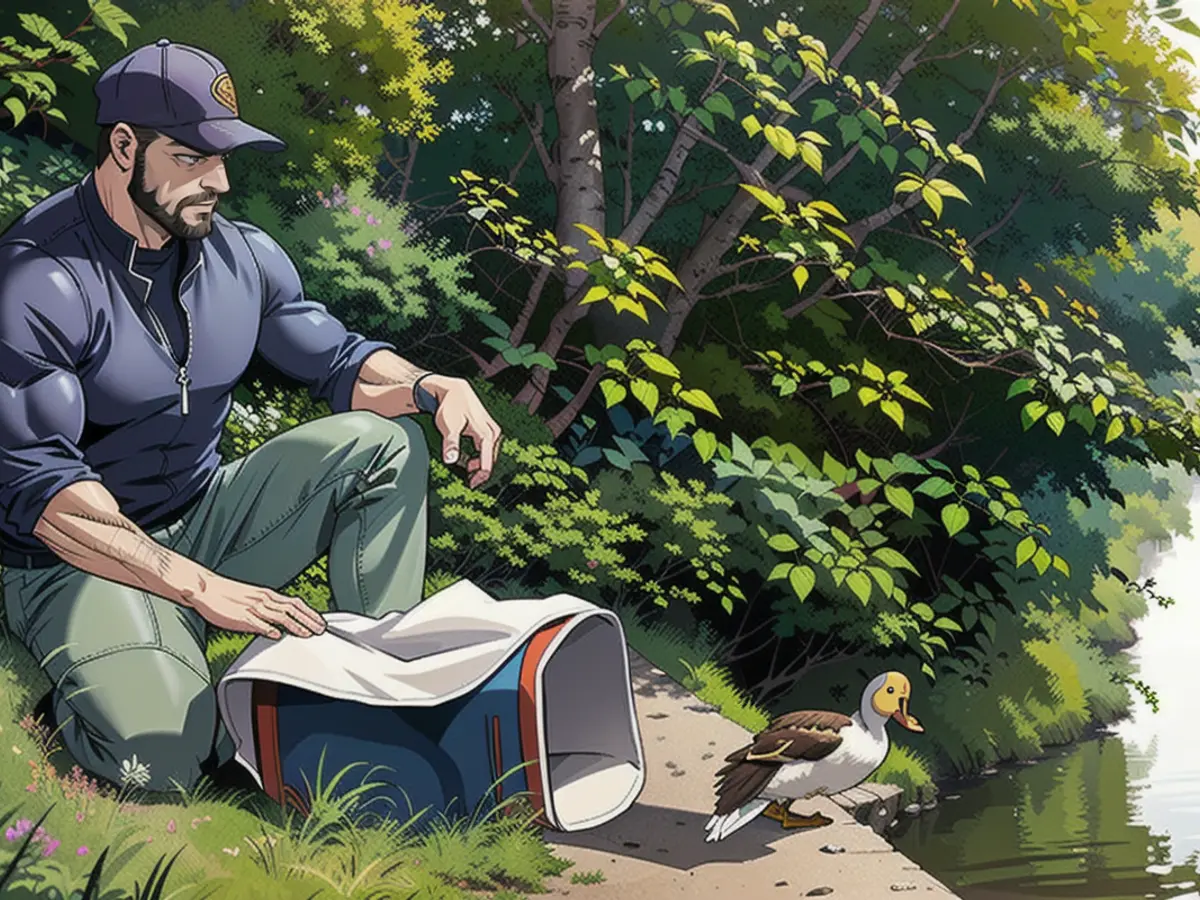NABU team offers help to duck families in Berlin for their relocation.
In urban areas, ducks are starting to nest on balconies, rooftops, and backyards. However, this can be dangerous for them due to the high risks involved. Marc Engler, leader of the NABU wild bird station in Berlin, and his team help these ducks find safer habitats.
Urban ducks like to build nests in flower boxes on balconies and rooftops. They seek out sheltered places, and it's not uncommon for them to reside on the 16th floor of a high-rise building in Spandau. While this might seem convenient, the real challenge comes when they need to make their way to the water with their chicks.
Engler and his team have been assisting mallards with this process for years because the journey to the water can be deadly for both the ducks and their young. Not only do they need to overcome significant height differences, but they also face the perils of traffic.
Marc Engler, from the NABU Berlin regional association, says, "Nationwide, I can only think of Wildvogelhilfe Leipzig which also systematically relocates ducks." During the breeding season, their tasks are quite intensive as they receive numerous calls for help. Not long ago, some Berlin residents contacted him for assistance. A family lived in a new development in Berlin-Adlershof, and they had a duck nesting on their balcony. Equipped with a cloth bag, a transport box, and food, Engler and his colleague, Marco Stelter, went to the residence to help. The food was meant to help distract and capture the animal.
Mama Duck on a Balcony Railing
The mallard sat in a flower box on the rooftop, with her chicks huddled under the shelf it rested on. The older couple living there was excited, as the duck had been balancing on the railing early that morning and calling out to her young. Although this behavior was common, the family was worried. The chicks had hatched the day before, but fortunately, the couple had taken some precautions to protect them from falling. Boards filled any gaps in their terrace, preventing the young from plummeting from the third floor to the concrete and potentially dying.
The duck's rescuers arrived, and the process went smoothly. Engler gave the mother duck some food, which helped her relax and easily bagged. Meanwhile, Stelter caught the chicks and placed them in a transport box. In their car, the pair weighed, measured, and banded the duck. They then headed off to the Müggelspree in Köpenick, where they opened the box and watched as the mother and her offspring entered the water. They swam away as if they had never been anywhere else.
150 Duck Removals in 2019
Staff members at the Berlin Wild Bird Station have been relocating duck families for over 20 years, according to Engler. The trend is rising, and last year, they received reports of over 200 mallard broods. He estimates that the actual number of ducks breeding in urban environments is much higher. In 2019 alone, they witnessed 159 relocations.
However, it's best if people can help move ducks themselves if they spot them near their balconies or backyards. Engler and his team are always available to provide phone assistance as well. Balcony owners should aim to hamper nest building by frequently visiting their balconies and rearranging furniture and plants to make the area less appealing to ducks. The German Animal Welfare Association echoes this advice.
Sometimes, even with the best efforts, things don't go as planned. "We've encountered cases where balconies aren't properly secured, and the chicks fall. Other times, we can't catch the mother duck, leaving us with just the chicks," Engler explains. In these circumstances, the young may be adopted by another mother duck.
Why Do Ducks Choose Balconies?
Engler's team mainly works in the water-rich districts of Spandau and Treptow-Köpenick but also frequently assists residents in the government district of Berlin-Mitte. Besides their relocation service, they are also studying why ducks choose to nest in such unconventional places and sometimes return to them year after year. "It's possible that there's a lack of protected spaces on the waterways, and the disruptions caused by people and dogs are too great," he says. Although this service aids the ducks, there's a risk they may become too reliant on it in the long term.
As ducks increasingly choose unconventional nesting locations, it's important for individuals to take action to help them and prevent potential hazards.

Read also:
- Floods: water levels remain critical in many places
- Snow chaos further restricts Bavaria
- Continuous operation in the flood areas
- Flood situation remains tense in many places
In international cities like Berlin, urban ducks often seek out unusual nesting spots, such as balconies and rooftops, due to the lack of protected habitats near water bodies. To ensure the safety of these animals, organizations like the Berlin NABU wild bird station provide relocation services for duck families, helping them find more secure living environments.
Given the rising trend of urban ducks building nests on balconies and rooftops, it's crucial for residents to work together with wildlife organizations to prevent potential hazards and provide safe living spaces for these animals.
Source: www.ntv.de






